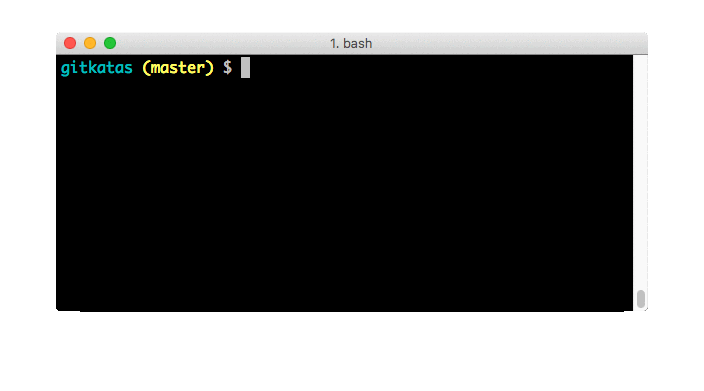| maintainer |
|---|
randomsort |
- Clone this repository
- Go into the folder you want to solve an exercise in
- Run the
setup.shscript - Consult the README.md in that folder to get a description of the exercise
This repository is a collection of Git exercises. The concept is stolen without shame from Schauderhaft.de. Unfortunately, they have not maintained the system - and we need more good Git exercises.
The exercises are designed for use when we are teaching Git courses. You should be able to use them as self-contained exercises that will allow you to keep your Git skills sharp.
Exercises starting with basic are entry-level - other exercises vary greatly in difficulty.
To get an overview of the exercises in here look in Overview.md.
Feel free to use these exercises, that's why they're public!
If you miss exercises or find errors in any of them, feel free to improve them and make a pull request.
You can also make an issue so we notice an opportunity to improve!
Thank you!
A collection of useful commands to use throughout the exercises:
# Cloning a repository
git clone https://github.com/praqma-training/git-katas.git # Clone this repository to your current working directory
# See local changes
git status # Show the working tree status
git diff # Show changes current working directory (not yet staged)
git diff --cached # Show changes currently staged for commit
# Add files to staging (before a commit)
git add myfile.txt # Add myfile.txt to stage
git add . # Add entire working directory to stage
# Make a commit
git commit # Make a new commit with the changes in your staging area. This will open an editor for a commit message.
git commit -m "I love documentation" # Make a new commit with a commit message from the command line
git commit -a # Make a new commit and automatically "add" changes from all known files
git commit -am "I still do!" # A combination of the above
git commit --amend # Re-do the commit message of the previous commit (don't do this after pushing!)
# We _never_ change "public history"
# Configuring a different editor
## Avoid Vim but stay in terminal:
- `git config --global core.editor nano`
## For Windows:
- Use Notepad:
`git config --global core.editor notepad`
- or for instance Notepad++:
`git config --global core.editor "'C:/Program Files/Notepad++/notepad++.exe' -multiInst -notabbar -nosession -noPlugin"`
# See history
git log # Show commit logs
git log --oneline # Formats commits to a single line (shorthand for --pretty=oneline --abbrev-commit )
git log --graph # Show a graph commits and branches
# Working with Branches
git branch my-branch # Create a new branch called my-branch
git checkout my-branch # Checkout ("Switch" to work on) my-branch
git checkout -b my-branch # Create a new branch called my-branch AND switch to it
git branch -d my-branch # Delete branch my-branch that has been merged with master
git branch -D my-branch # Forcefully delete a branch my-branch that hasn't been merged to master
# Merging
git merge master # Merge the master branch into your currently checked out branch.
git rebase master # Rebase current branch on top of master branch
# Working with Remotes
git remote # Show your current remotes
git remote -v # Show your current remotes and their URLs
git push # Publish your commits to the upstream master of your currently checked out branch
git pull # Pull changes from the remote to your currently checked out branch
# Aliases - it's possible to make aliases of frequently used commands
# This is often done to make a command shorter, or to add default flags
# Adding a shorthand "co" for "checkout"
git config --global alias.co "checkout"
# Usage:
git co # Does a "git checkout"
## Logging
git log --graph --decorate --pretty=oneline --abbrev-commit --all # Show a nice graph of the previous commits
## Adding an alias called "lol" (log oneline..) that shows the above
git config --global alias.lol "log --graph --decorate --pretty=oneline --abbrev-commit --all"
## Using the alias
git lol # Does a "git log --graph --decorate --pretty=oneline --abbrev-commit --all"There is a very small test that you can run in powershell or bash.
It is contained in the scripts test.sh and test.ps1.

